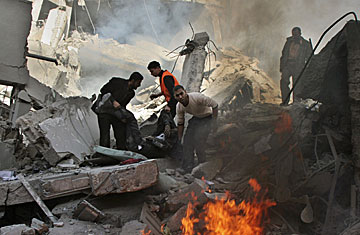
Palestinians carry a wounded man from a building struck by an Israeli missile in Gaza City
Israel continued to pound targets in Gaza from the air on Monday even as it made final preparations for a ground assault. The Israeli military offensive began on Dec. 27, after the lapse of a six-month-long de facto cease-fire between Israel and the government of the Palestinian militant group Hamas. Israel says its operation will continue until Hamas stops firing rockets at Israeli towns along the border with Gaza. Hamas wants an end to the economic chokehold Israel has applied to the crowded Mediterranean territory.
Hamas fired some 60 mortars and rockets into Israel on Monday, including one that killed an Israeli Arab in Ashkelon — the second Israeli casualty since the beginning of the air assault. The death toll in Gaza rose to at least 315 people, according to Palestinian officials. The United Nations says at least 51 of them were civilians. (See pictures of Israel's deadly assault on Gaza.)
Though the rocket count was down from previous days (and well short of the 200 that Israeli officials believe Hamas is able to fire), Israeli military sources tell TIME that they believe Hamas' military capabilities have hardly been dented. And while Israeli strikes killed a senior Hamas police official on the first morning of the assault and an Islamic Jihad military commander in Khan Younis on the third day, those same Israeli military officials believe that most of Hamas' military commanders have survived the first 60 hours or so and are in hiding.
Indeed, while Israelis support the military offensive by an overwhelming majority of 81%, according to a poll by Israel's Channel 10 television station, only 6% believe it will end Hamas' rocket attacks. Palestinians, meantime, have been buoyed by an outpouring of support and sympathy across the Arab world.
But the support is not quite universal. The Israeli strikes have revealed, once again, the stark differences between pro-Western Arab leaders like Hosni Mubarak of Egypt and more radical Arab groups like Hizballah in Lebanon. Hizballah leader Hassan Nasrallah has slammed the Egyptian government for suggesting that Hamas brought the attack upon itself. In an angry televised speech Sunday, Nasrallah said Cairo was cooperating with Israel and was selling out not only Palestinians but all Arabs. "There are some who speak of Arab silence, but this is wrong," he said. "There is full Arab cooperation, especially by those who have signed so-called peace agreements with Israel."
In Jordan, another country to have made its peace with the Jewish state, officially at least, angry members of parliament burned the Israeli flag in a rare parliamentary protest. "It has been proven that making peace with Israel is a strategic mistake," a senior Jordanian official told TIME. "Israel is proving every day that it is not interested in peace. The Israeli actions are spitting in the face of Jordan and Egypt."
The regimes in Egypt, Jordan and other Arab states have long worried about the rise of fundamentalist groups. When Hamas won Palestinian parliamentary elections just under three years ago, neighboring Arab governments grew even more nervous — and more determined to repress similar groups in their own countries. Never mind that a large reason for Hamas' rise was the dictatorial and corrupt ways of the old Fatah government, characteristics all too common in many Arab capitals.
Now the famed Arab street has a new rallying cry, and it's only likely to help the more extreme groups and parties. "We have two choices," says Fawzi Barhoum, a Hamas spokesman in Gaza. "We hoist the white flag or we continue resisting Israel and its aggression." There is no mistaking which course the vast majority of Arabs want to follow.
